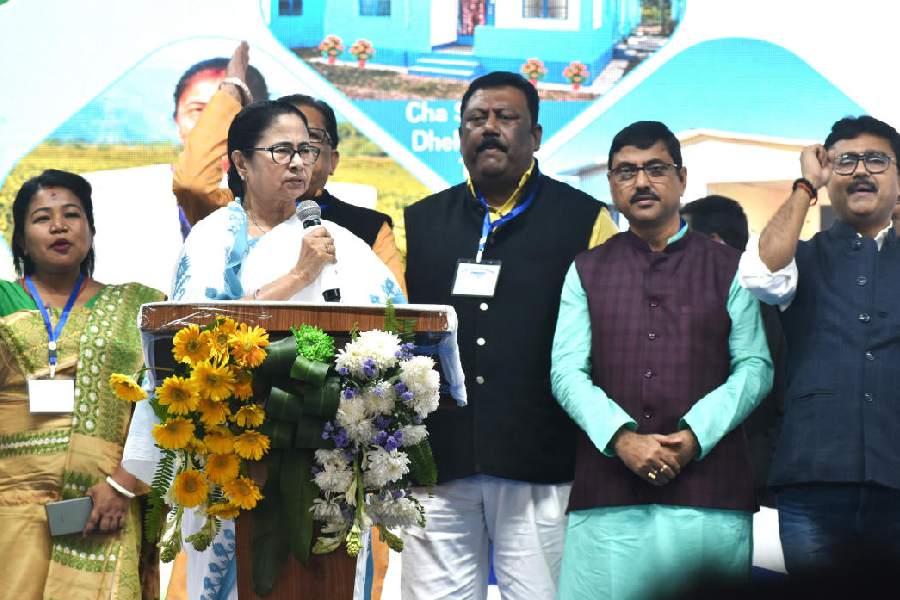Chief minister Mamata Banerjee on Sunday iterated her government’s commitment to the welfare of tea garden workers by granting them land rights, building free houses for them and improving healthcare in the brew belt.
Mamata attended a public service distribution programme at the Parade Ground here and inaugurated a number of projects in the brew belt of Alipurduar, a district with 64 tea estates.
“Today, we handed over ‘pattas (secured land tenures)’ to 6,000 tea workers in the district. The district magistrate should expedite the process of identifying land in tea gardens which can be provided to the workers. We want to ensure that each tea garden worker in north Bengal has land right,” said the chief minister.
The state government’s decision to provide land rights to tea workers, who have been living on leasehold land of tea companies in gardens for generations, has been hailed as a game-changer for the Trinamul Congress by political pundits.
“It is a major move by the Trinamul government and will provide a political dividend to the ruling party. The government’s decision to provide free houses to the workers will also give Trinamul an advantage,” said an observer.
Addressing the audience which mainly comprised tea workers, Mamata said from now on, the government would provide funds to them to build their own houses.
“We have built around 1,000 houses under the Cha Sundari scheme in Alipurduar. As we are providing land rights now, we will hand over Rs 1.20 lakh to each such worker so that he can build his own house on his land,” said Mamata.
In Alipurduar, close to eight lakh people live in tea gardens.
“We have built health centres and crèches for women workers where they can keep their children during work in tea gardens. All social welfare schemes are being extended to people living in the gardens. We believe in meeting our commitments and don’t make empty promises,” said the chief minister.
In the course of her speech, Mamata instructed officials of the state labour department to provide a monthly assistance of Rs 1,500 to workers of six tea estates which are close in the district now.
“We have opened some of the closed gardens. Our government is putting in efforts to reopen closed gardens,” said Mamata.
Her announcements, coupled with the inauguration of new facilities, hinted Trinamul was keen to regain its support base in the tea belt. Election results of three Lok Sabha seats — Alipurduar, Jalpaiguri and Darjeeling — depend on the support of the tea garden population.
In 2019, the BJP had won all the three seats as the majority of the people living in the gardens had sided with the saffron party.
At the meeting, Mamata instructed officials of the district administration to expedite development projects in tribal areas. In Alipurduar, out of the total population, around 32 per cent belong to Scheduled Castes and around 26 per cent to Scheduled Tribes.
“We have reports that a section of tribal people don’t have government certificates. Also, some fake certificates have been issued and those have to be cancelled. We will have to ensure that they are provided with certificates at the next edition of Duare Sarkar camps. Special camps should be conducted in tribal belts. The PHE department is working in these areas to provide water and we want the work to finish at the earliest,” said Mamata.
In the Dooars and the Terai, different tribal communities who live in tea gardens and villages constitute a considerable portion of the vote bank.










